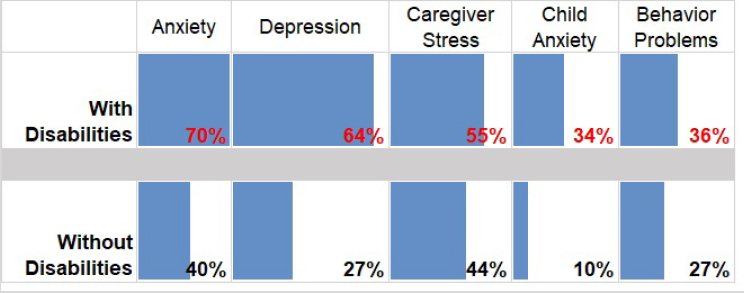Over 1.9 million children under age five have a disability, nearly 8% of all children in this age group.

According to the national Early Childhood Rapid Assessment of Pandemic Impact on Development (RAPID) family survey launched by the Center For Translation of Neuroscience at the University of Oregon, young children with disabilities and their parents or caregivers, fare worse across a range of mental health markers than their counterparts. The study findings are based on listening to the voices of thousands of parents and other caregivers in households with young children. Across all family respondents with children 5 years old and younger there were significant changes in the mental health of all caregivers and children with and without disabilities since the outset of COVID-19.
The consequences of ongoing child anxiety and stress have the potential of altering brain functioning, attention and a host of factors considered essential for child development and learning.
The survey data also suggest a double hit from having a young child with a disability and having financial difficulties including those that have a sustained loss of employment in which there are difficulties in paying for basic necessities and more generally in which income is below the federal poverty level. Behavior problems and anxiety levels in children have not improved since the start of the pandemic as compared with children that do not have a disability. This indicates an ongoing need for enhanced supports for children with disabilities and these supports will require innovative approaches to service delivery outside of the classroom and in the home.
For children and families with disabilities the results are deeply troubling when compared with families raising children that do not have a disability.
High Rates of Family Stress
For children and families with disabilities the results are deeply troubling when compared with families raising children that do not have a disability. Rates of stress, depression and anxiety in adults are significantly higher in households where a young child has a disability than what is being reported for all other households in the survey. Reported rates of child behavior problems and anxiety are similarly high.
We want you to know that our team is dedicated to addressing these concerns. There are several good resources we plan to share with you over the next few months. Please do not hesitate to reach out to our Early Childhood Associates team for assistance including access to resources and support

